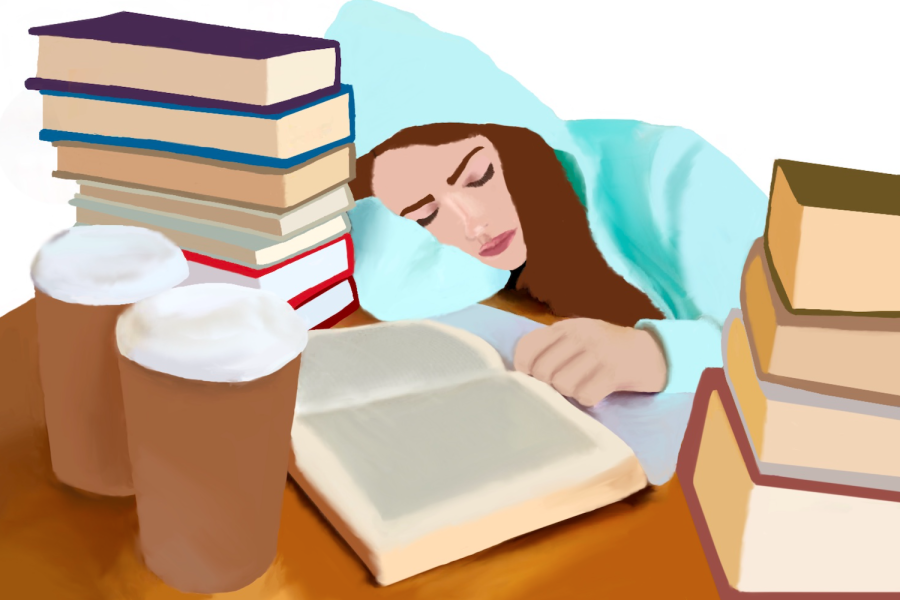I woke up to the agitating sound of my alarm clock. It was 6:15 a.m. on a Tuesday. My head felt groggy and my eyelids were heavy. The night before, I was up past midnight finishing the day’s load of homework. I forced myself out of bed with a picture of a Beatles coffee cup in my mind.
The majority of teens get about 6.5 to 7.5 hours of sleep each night according to Better Health, despite school and NHS guidance that teens should receive eight to 10 hours every night. In fact, 70% of teens do not get the recommended amount of sleep, according to Child Mind Institute. Sleep deprivation is a dominant issue in teenage lives, but its extremity is often overlooked.
According to Sleep Foundation, early school start times, busy schedules, the use of digital devices, anxiety, depression and ADHD can all contribute to a lack of sleep or interrupted sleep for teens. In my experience, homework is the primary factor that prevents me from getting eight hours of sleep. This comes as the result of bad planning around my extracurricular activities. I recommend using a calendar to plan out your activities around schoolwork, to ensure you get enough sleep.
One significant impact of getting an inadequate amount of sleep is that it can limit teens’ attention span and ability to focus, slowing down reaction time and thinking, according to Sleep Foundation. Sleep is critical to brain health as neurons regenerate while asleep. Without sufficient sleep, these neurons become overburdened, disabling students from being able to think deeply, causing a subsequent negative impact on memory and problem-solving skills.
Consequently, teenagers who sleep less are at an academic disadvantage compared to those who rest for the recommended duration. Teens who obtain the recommended hours of sleep will be able to concentrate more deeply and thus, will likely perform better in school.
In addition, getting enough sleep is fundamental for the physical health of teens. Physical growth and brain development is a process that takes place overnight according to NewFolks, and as a result, sleep is an essential part of their development. Not only is sleep essential for teen development, it can also prevent future health-related risks.
Furthermore, lack of sleep has proven to deteriorate mental and emotional health in teens, according to Better Health. Sleep deprivation can also worsen self-esteem, thus having the potential to limit teens from reaching their potential at school and in other activities. The direct connection between sleep and mental health is frequently disregarded, so students must acknowledge that sleep can have critical effects on self-esteem and long-term mental health.
Students should realize that the only way to sustain themselves during the school day is to maintain healthy habit.
Although some teens argue that they can function optimally on little sleep with the help of coffee, this is a false reality. Inordinate coffee consumption by teenagers can cause chest pain, breathlessness and fatigue, according to the National Library of Medicine. Frequent coffee intake even impacts the sleep cycle. For me, whenever I drink coffee to stay awake, I feel shaky and breathless. Unlike a good night’s sleep, the effect of coffee eventually wears off, and I can barely stay awake.
Coffee consumption doesn’t reverse the impacts for long and can contribute to damage caused to the sleep cycle. Thus, teenagers should not depend on coffee as a replacement for sleep, and students should realize that the only way to sustain themselves during the school day is to maintain healthy habits.
Health Teacher Mariam Mathew said students might be aware of the impacts of sleep deprivation but lack understanding of how to truly make a change to their sleep schedule. Students must distinguish the difference between acknowledging that sleep is important and actually having the self-discipline to eliminate distractions, and just rest. It is essential that teens eliminate distractions or anything that is shortening their sleep duration.
Students must distinguish the difference between acknowledging that sleep is important and actually having the self-discipline to eliminate distractions, and just rest.
It is evident that sleep deprivation in teens has serious effects, but how can struggling teenagers improve their sleep? According to Better Health, one step teens can take is attempting a calming pre-bedtime activity. Whether it be taking a bath, having a hot drink or meditating, all can be a relaxing bedtime activity. Another solution is to limit screen time right before bed. For me, establishing a separate workspace from my bed helps me truly disconnect from my responsibilities and just rest.
Students can also use a calendar or planner to schedule time for homework and extracurriculars in order to make sure they never get overwhelmed on any one evening, and to prevent work and stress from feeding into critical sleep time.
I urge you, next time you’re lying in bed endlessly scrolling through TikTok, or rushing to complete an assignment, to remember the importance of sleep. Incomplete homework has fewer consequences than the sleep you are missing by trying to complete it. And just maybe, the next morning, you will finally understand what’s going on during first block.





